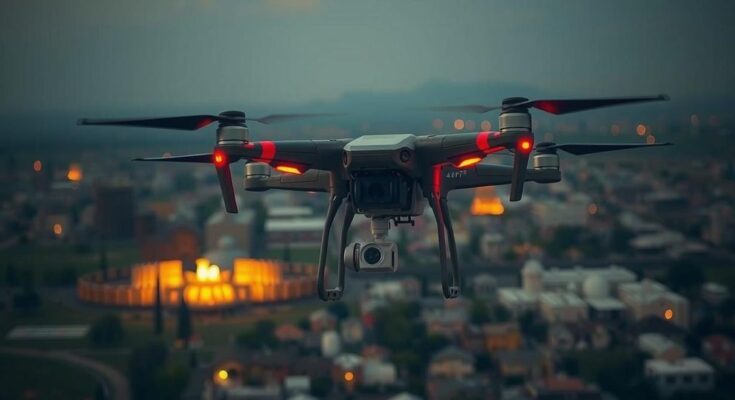Iran and the UAE’s supply of UAVs to Sudan is prolonging the conflict between the SAF and RSF, escalating the humanitarian crisis. Drones play a pivotal role in military operations, with both sides utilizing them for attacks, including on civilians. The situation is further complicated by violations of a UN arms embargo, suggesting that foreign assistance is critical in determining the conflict’s duration and intensity.
Since January, Iranian cargo aircraft have been observed frequently at the airport in Port Sudan, the operational base for the ruling junta headed by General Abdel Fattah al-Burhan of the Sudanese Armed Forces (SAF). Following the arrival of these aircraft, the SAF has initiated offensives against the rival Rapid Support Forces (RSF) utilizing Iranian-made Mohajer-6 unmanned aerial vehicles (UAVs). Concurrently, the United Arab Emirates (UAE) and Russia have been supplying the RSF with military resources, including quadcopter drones modified to deploy 120 mm mortar shells, a strategy also employed by the SAF.
Drones have emerged as a critical element in the conflict between the SAF and RSF, with both factions vying for control over Sudan’s abundant natural resources. The involvement of foreign nations underscores the broader geopolitical stakes, as these powers seek to bolster their influence in Sudan amidst the ongoing turmoil. The influx of drones from these countries has raised concerns as it violates the United Nations arms embargo against Sudan.
Much of the logistical support from Russia and the UAE has reportedly traversed through Chad and Libya, with claims that the UAE has masked its military assistance as humanitarian aid for displaced populations. The mercenary group Africa Corps, previously known as the Wagner Group, is implicated in trafficking weaponry and military technology to the RSF, while the Russian government maintains formal allegiance to the SAF.
The RSF has deployed its drones not only to target SAF military assets but also to strike civilian infrastructure, leading to significant casualties among non-combatants. The SAF has similarly utilized drone strikes against civilian entities. The introduction of Iranian drones has enabled the SAF to regain territory, including the state broadcaster and strategic parts of Omdurman, Sudan’s largest urban center.
Since conflict erupted in April 2023, fatalities have surpassed 15,000, with millions displaced. Health experts have reported rising mortality rates from preventable diseases among vulnerable populations due to the destruction of medical services, particularly in North Darfur. The ongoing influx of drones is likely to perpetuate the conflict, counteracting international mediation efforts, as evidenced by the SAF’s rejection of peace negotiations in Jeddah, Saudi Arabia.
Experts assert that should the UAE sever its ties with the RSF, there is a significant possibility—around 80%—that the conflict could conclude rapidly. This assertion emphasizes the critical role of foreign support in the protraction of the Sudanese conflict.
The conflict in Sudan has intensified following power struggles between competing military factions, chiefly the Sudanese Armed Forces (SAF) and the Rapid Support Forces (RSF). The involvement of regional powers, particularly Iran and the UAE, in supplying military drones and arms has complicated the situation, contributing to widespread violence and humanitarian crises. The United Nations has issued an arms embargo against Sudan, but violations by foreign powers continue to exacerbate the conflict, making a peaceful resolution increasingly elusive.
The ongoing conflict in Sudan, significantly influenced by foreign military support and the proliferation of drone warfare, raises urgent humanitarian concerns. The impact of drone strikes on both military and civilian targets highlights the need for international intervention to establish a ceasefire and restore stability. To end the conflict effectively, reducing foreign involvement, particularly from the UAE and Iran, is essential. Without significant changes in external support dynamics, the prospects for peace in Sudan remain grim.
Original Source: www.defenceweb.co.za




